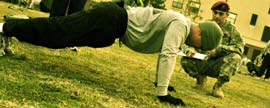Introduction
After Action Reviews (AARs) are an extremely useful tool if planned and conducted properly. Conversely AARs that are improperly prepared and executed can be detrimental to the event and the overall morale of the element. The main point to remember when conducting an AAR is not to place blame, or turn the session into a lecture. Remember everyone’s opinion is valuable.
Involve everyone in the AAR. As leaders we have not cornered the market on good ideas and advice. Sometimes we need to be good followers or better yet, good listeners. Young Warriors often times have useful insight and a different perspective on a given event or procedure. Use their thoughts and suggestions for the benefit of the team.
I once received some wise advice from two very good leaders:
- To be a Great Leader you must first be a Great Listener!
- God gave you one mouth and two ears for a reason; listen twice as much as you speak.
Planning and Preparation
An AAR allows all participants involved in the event to discover for themselves what happened during the event. It is also a useful method for soliciting new ideas on how training could be improved. The basic questions or areas that should be covered in an AAR are:
- What was supposed to happen?
- What happened?
- Why did it happen that way?
- How could it be done differently?
Each AAR should be planned into the training event. The Commander must make the AAR a priority. The Commander should develop an AAR plan that should include the following information at a minimum:
- Who will observe the training and conduct the AAR?
- Observer/Controllers: During the planning phase, leaders must ensure that they have selected quality observers/controllers. These individuals should not participate in the training and they must be:
- Able to perform the tasks to be trained.
- Experienced in the duties they are to evaluate.
- Knowledgeable in current doctrine.
- Know what elements of the task or tasks to evaluate
- Fully understand training standards and conditions
3. Who will attend the AAR?
- The Commander must ensure that all personnel involved in the training event attend the AAR. This includes Key personnel from the Opposing Forces (OPFOR).
Make the best of your AAR. By planning and preparing you ensure you make the most of this event and your Soldiers benefit as well.
For More Information on this subject see the following resource(s):













